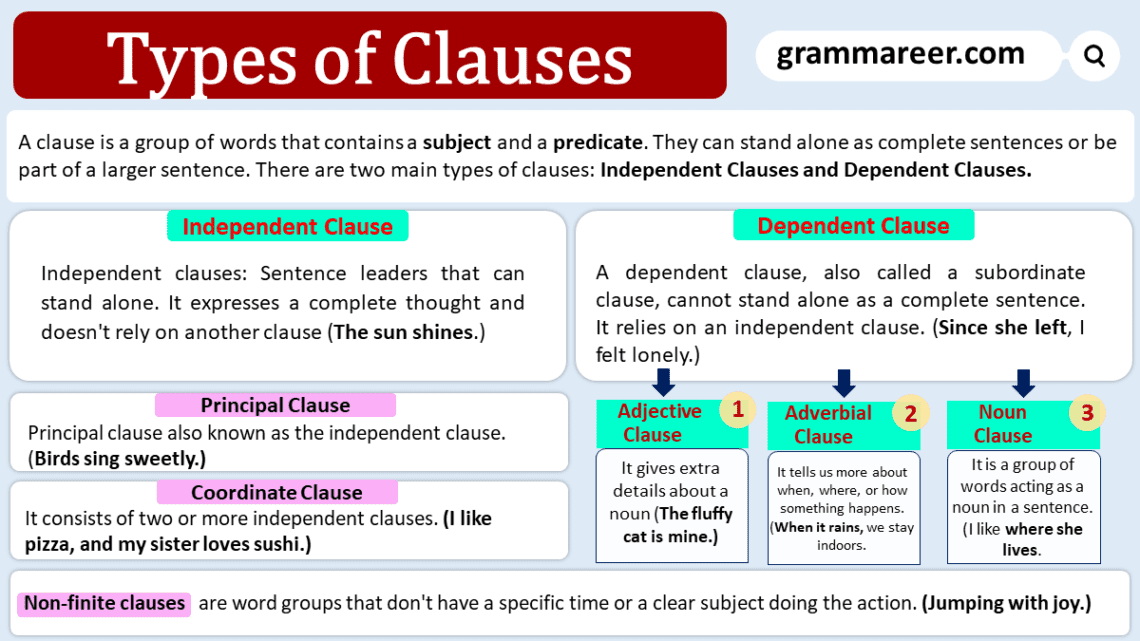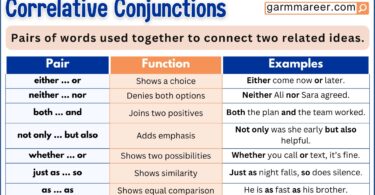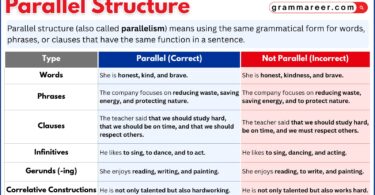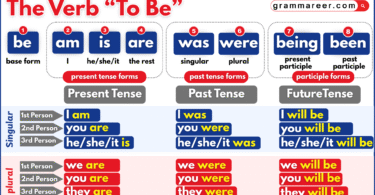When we talk about sentences in English, clauses are at the heart of it all. A clause is simply a group of words that has a subject and a verb. Sometimes a clause can stand alone as a complete sentence, and sometimes it needs a little help from another clause. Learning how clauses work makes writing clearer and speaking smoother.
In this article, we’ll break down what clauses are, the different types you’ll come across, and how to use them with ease—with clear examples.
Table of Contents
What Is a Clause?
Before we learn the types of clauses, let’s start with the basics. A clause is a group of words that makes sense because it has both a subject and a verb. Clauses can either stand alone as a complete sentence or be part of a larger sentence.
Definition of Clause
A clause is defined as a group of words containing a subject and a predicate (verb) that together express a complete idea or form part of a sentence.
Example:
- She runs every morning.
- (Here, she is the subject and runs is the verb.)
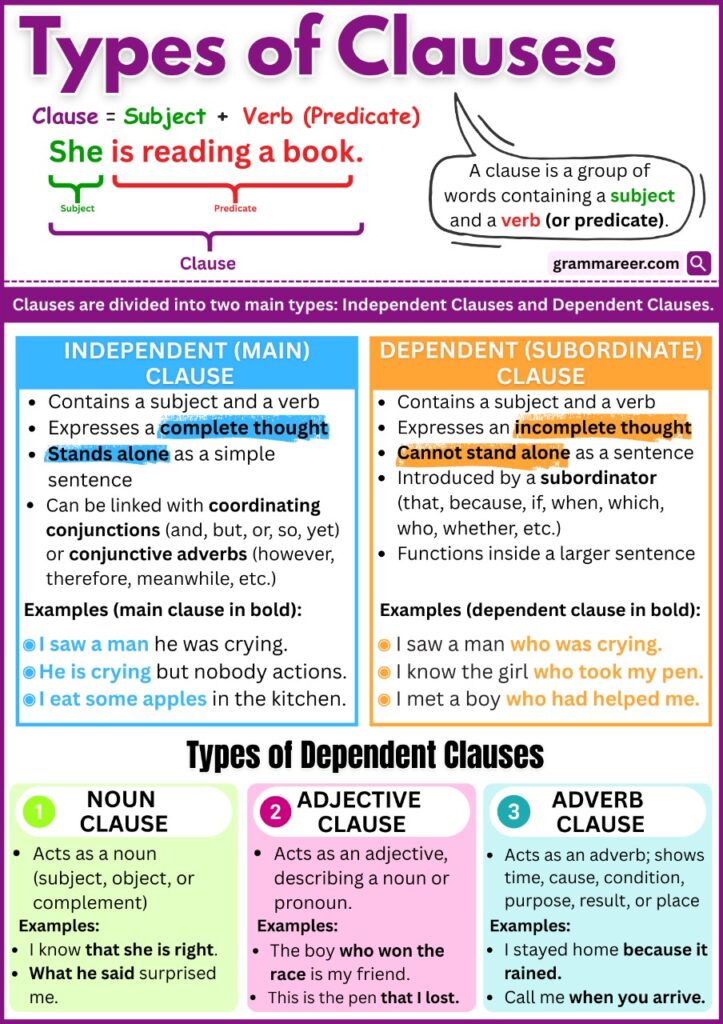
Types of Clauses
Clauses are mainly divided into two big categories: independent clauses and dependent clauses. From these, we get more specific types. Let’s go step by step.
Independent Clause
An independent clause has a subject and a verb and expresses a complete thought. It can stand alone as a sentence.
Example:
- She reads every night.
- Complete idea: who (she) + what she does (reads).
- The sun is shining brightly.
- Subject (the sun) + verb (is shining) = a full thought.
- They went to the park.
- Subject (they) + action (went) makes sense on its own.y evening.
This is a complete thought, so it’s an independent clause.
Note: An independent clause is also called a principal clause. It expresses a complete thought and can stand alone as a sentence.
Dependent Clause
A dependent clause has a subject and a verb but does not express a complete thought. It depends on an independent clause.
Examples:
- Because she was tired
- Incomplete. Needs more words: She went to bed because she was tired.
- When the movie ended
- Feels unfinished. Complete: We clapped when the movie ended.
- Although he studied hard
- Incomplete alone. Complete: He passed the exam although he studied hard.
Note: Whenever the dependent clause comes first in a complex sentence, it’s followed by a comma.
Examples:
- When the movie ended, we clapped.
- Because she was tired, she went to bed early.
How Clauses Work in English?
Clauses work in different ways. In English, a clause can act like a noun, an adjective, or an adverb depending on how it’s used. Let’s break them down with easy examples.
Noun Clauses
A noun clause works like a noun in a sentence. You can test this by replacing it with a single noun, and the sentence will still make sense.
Example:
- I believe her victory.
- I believe that she will win the competition.
Here, that she will win the competition is a noun clause because it’s the “thing” I believe.
Adverbial Clauses
An adverbial clause tells us more about the verb—usually answering when, why, how, or where.
Example:
- He stayed inside because it was raining.
- He stayed inside due to the rain.
Adjective Clauses
An adjective clause (also called a relative clause) describes a noun, just like an adjective does. It often starts with words like who, which, or that.
Example:
- The book that I borrowed from the library is fascinating.
- The library book is fascinating.
How to Combine Clauses?
Every sentence you write must have at least one independent clause. When you want to add more information, you need to join it with other clauses. The way you connect them determines what kind of sentence you create.
Compound Sentences
When two or more independent clauses are joined together, the result is a compound sentence. Independent clauses in these sentences are linked using:
- a comma + coordinating conjunction (for, and, nor, but, or, yet, so),
- a semicolon, or
- a colon.
This process is called coordination.
Examples:
- I enjoy iced coffee, but it keeps me awake at night.
- The children were tired; their parents took them home early.
Complex and Compound-Complex Sentences
If you join an independent clause with a dependent clause, you form a complex sentence. To do this, you use a subordinating conjunction (such as because, although, since, while, if, before, after, until, etc.).
If a sentence contains two or more independent clauses plus at least one dependent clause, it becomes a compound-complex sentence.
Examples:
- The concert started late because the singer was delayed.
- While we were having dinner, the lights went out.
- Before you submit your work, check it for errors.
Relative Clauses
A relative clause is a type of dependent clause that gives extra details about a noun or pronoun in the main sentence. These clauses usually begin with relative pronouns like who, whom, whose, which, or that.
Examples:
- The teacher who helped me with math is very patient.
- The phone, which I lost yesterday, has been found.
- The student whose bag was stolen reported it to the office.
Non-finite Clauses
Unlike finite clauses, non-finite clauses don’t show tense or a complete subject-verb relationship. Instead, they use forms like to eat, eating, eaten and usually add extra detail.
Examples:
- To win the match was his only goal.
- She left the room crying silently.
Clauses vs Phrases
A clause is more complete than a phrase but not always a full sentence. The reason is that a clause has both a subject and a verb. Because of this, some clauses can stand alone as sentences, while phrases cannot.
Here’s the difference:
- Phrase: running in the park
- Clause: She runs in the park
A clause can work as a sentence by itself. It can also be part of a complex sentence.
For example:
- She runs in the park every morning before school.
Why Clauses Are Important?
Clauses are important because they are the foundation of sentences. A clause has a subject and a verb, which means it can share a complete thought, like She is reading. Without clauses, we wouldn’t be able to create proper sentences.
They also help us add detail and variety. For example, in I stayed home because it was raining, the dependent clause because it was raining explains the reason. This is why clauses matter—they make our writing clearer, more connected, and easier to understand.
FAQs
A clause is a group of words that includes a subject and a verb, forming part of a sentence.
An independent clause can stand alone as a complete sentence, while a dependent clause needs another clause to make a complete thought.
An adjective (relative) clause adds details to a noun, often starting with words like ‘who,’ ‘which,’ or ‘that.’
An adverbial clause provides information about when, where, why, or how an action in the main clause occurs.
We use a noun clause when we want to treat an entire clause as a single noun, acting as the subject, object, or complement in a sentence.
You May Also Like
All Parts of Speech
Participle Phrases in English
What is Noun Phrase?
What are Prepositional Phrases?

